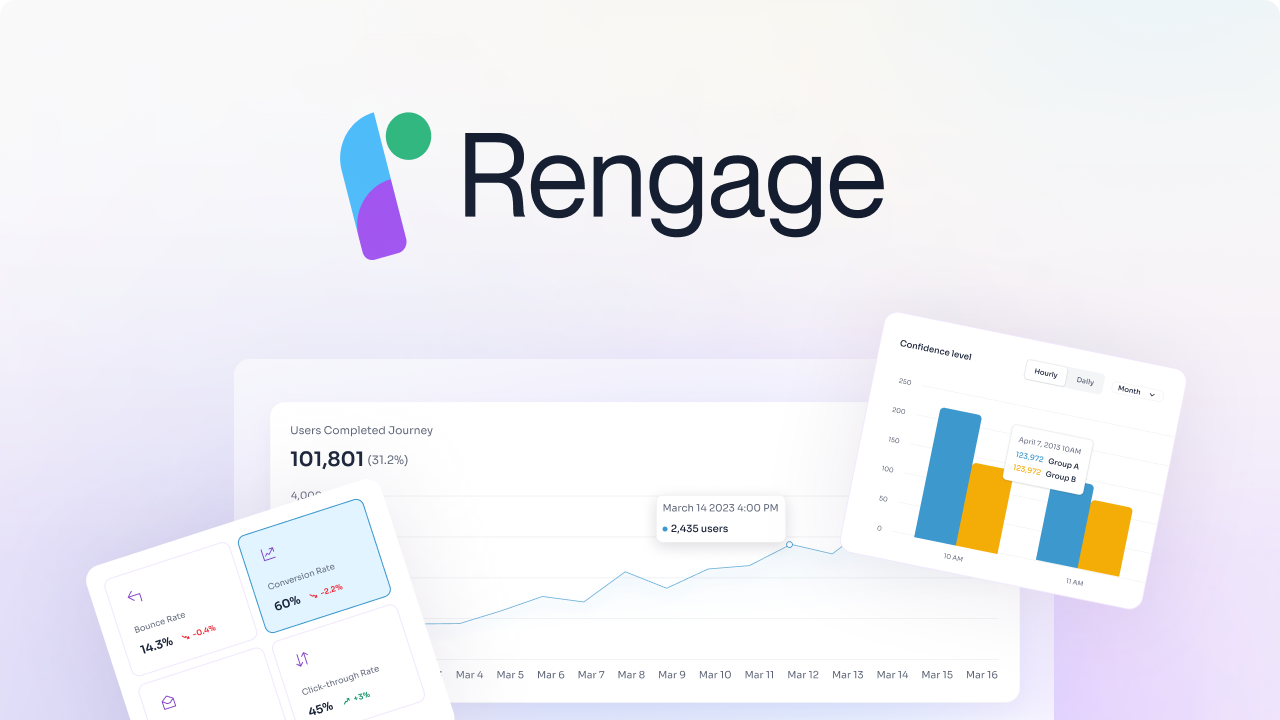Omnichannel marketing software has transformed how businesses interact with customers, creating a seamless, personalized experience across all touchpoints. Picture this: A customer finds a product online, visits the physical store, and receives a follow-up email with related offers. In this article, we explore into the the best 10 omnichannel marketing software in 2024, offering you insights on selecting the right platform to elevate your brand's omnichannel customer experience.
Looking to enhance your brand's omnichannel customer experience? Rengage's omnichannel marketing platform offers all the tools you need to streamline your operations and reach your goals effectively.
Table of Contents
-
What is Omnichannel Marketing?
-
Streamlining and Enhancing Customer Interactions
-
What Are The Key Features to Look For In AN Omnichannel Marketing Software
-
Top 10 Omnichannel Marketing Software Solutions
-
Choosing the Right Omnichannel Marketing Software
-
Create Personalized Experiences That Drive Loyalty and Growth with Rengage's Omnichannel Marketing Platform
What is Omnichannel Marketing?

Omnichannel marketing focuses on providing a seamless and integrated customer experience across multiple channels and touchpoints. Unlike multichannel marketing, which involves using various channels independently, omnichannel marketing aims to unify all channels into a cohesive, interconnected ecosystem. This approach ensures that customers receive a consistent message and experience regardless of how they interact with a brand—whether through a website, mobile app, social media, physical store, or customer service hotline.
Key Elements of Omnichannel Marketing
1. Unified Customer Experience
Omnichannel marketing prioritizes consistency. It ensures that whether a customer engages via a mobile device, visits a physical store, or interacts on social media, they receive a consistent brand message, product information, and service quality.
2. Seamless Integration:
Channels are interconnected, allowing customers to transition between them effortlessly. For example, a customer might browse products online, receive personalized recommendations via email, and finalize their purchase in-store—all without encountering disjointed experiences.
3. Personalization
Omnichannel strategies leverage data to deliver personalized experiences. By tracking customer behavior and preferences across channels, brands can tailor recommendations, promotions, and content to individual interests, increasing relevance and engagement.
4. Data-Driven Insights
The integration of customer data from various touchpoints provides valuable insights into customer behavior, preferences, and journey patterns. This data fuels informed decision-making, allowing marketers to optimize campaigns, improve targeting, and enhance overall customer satisfaction.
5. Customer-Centric Approach
Omnichannel marketing prioritizes the customer journey. By mapping and understanding how customers interact with different channels throughout their buying process, brands can identify pain points, optimize touchpoints, and ultimately improve conversion rates and customer loyalty.
Importance of Omnichannel Marketing
1. Enhanced Customer Experience
By offering a seamless and consistent experience, omnichannel marketing improves customer satisfaction and loyalty.
2. Increased Engagement
Omnichannel strategies foster deeper engagement by meeting customers where they are and delivering relevant content and offers based on their preferences and behavior.
3. Improved Brand Perception
Consistent messaging and experiences across channels reinforce brand identity and values.
4. Higher Conversion Rates
By optimizing the customer journey and reducing barriers to purchase, omnichannel marketing can lead to higher conversion rates.
5. Competitive Advantage
In a competitive marketplace, offering a superior omnichannel experience can differentiate a brand from its competitors.
6. Operational Efficiency
While omnichannel marketing requires integration and coordination across channels, it also streamlines processes and efficiencies.
7. Adaptability to Consumer Behavior
Consumer behavior continues to evolve, with an increasing preference for digital interactions alongside physical experiences.
8. Long-Term Customer Relationships
By building trust and delivering consistent value throughout the customer journey, omnichannel strategies contribute to long-term customer relationships.
Related Reading
- Omnichannel CRM
- Omnichannel Marketing Tools
- Omnichannel eCommerce
- Omnichannel Marketing Strategy
- Omnichannel Personalization
- Omni Channel Marketing Examples
- Omni Channel Customer Engagement
- Omnichannel Marketing Automation
- Multichannel Marketing Automation
- Marketing Automation ROI
Streamlining and Enhancing Customer Interactions

Omnichannel marketing software represents a pivotal tool in modern marketing strategies, designed to unify and optimize customer interactions across multiple channels seamlessly. In today's digital landscape, where consumers expect personalized and consistent experiences, omnichannel marketing software empowers businesses to deliver cohesive messaging and engagement strategies throughout the customer journey.
Understanding Omnichannel Marketing Software
Omnichannel marketing software integrates various communication channels, including:
- Social media
- Websites
- Mobile apps
- Physical stores
This integration enables businesses to create a holistic view of each customer's preferences, behaviors, and interactions across different touchpoints. By consolidating data from these channels, businesses gain actionable insights that facilitate personalized marketing campaigns and targeted messaging.
Key Features and Capabilities
1. Enhancing Customer Experience
At its core, omnichannel marketing software aims to enhance the customer experience by providing a seamless and personalized journey. Through data-driven insights, businesses can anticipate customer needs and deliver relevant content and offers at the right time and through the preferred channel of each individual customer. This personalized approach:
- Fosters customer loyalty
- Increases satisfaction
- Drive higher conversion rates and lifetime customer value
2. Streamlining Operations and Efficiency
From a business perspective, omnichannel marketing software streamlines operations by centralizing customer data and marketing activities into a single platform. This consolidation reduces manual efforts and improves efficiency, allowing marketing teams to focus on strategy development and creative initiatives rather than repetitive tasks. Automation features further enhance efficiency by:
- Scheduling campaigns
- Segmenting audiences
- Optimizing content delivery based on predefined rules and triggers
3. Measuring Success with Data-Driven Insights
A significant advantage of omnichannel marketing software is its capability to provide comprehensive analytics and reporting. Marketers can measure the effectiveness of campaigns across various channels, track key performance indicators (KPIs) such as:
- Engagement rates
- Conversion rates
- Return on investment (ROI)
- Gain insights into customer behavior and preferences
This data-driven approach enables continuous optimization of marketing strategies, ensuring ongoing relevance and effectiveness.
4. Integrating with Existing Systems
Omnichannel marketing software is designed to integrate seamlessly with existing systems and technologies, such as:
- Customer relationship management (CRM) platforms
- Ecommerce solutions
- Analytics tools
This integration ensures that businesses can leverage their existing infrastructure while enhancing capabilities for personalized marketing and customer engagement. It also facilitates a unified view of customer interactions and enables data synchronization across different platforms.
5. Scalability and Flexibility
Scalability is another key benefit of omnichannel marketing software, particularly for growing businesses or those with diverse customer bases. The software accommodates increasing volumes of data and interactions without compromising performance, supporting businesses in scaling their marketing efforts effectively. The flexibility of omnichannel solutions allows businesses to adapt to:
- Changing market trends
- Customer preferences
- Technological advancements seamlessly
6. Overcoming Challenges and Maximizing Impact
While omnichannel marketing software offers numerous benefits, implementing and maximizing its impact can present challenges. These may include:
- Data integration complexities
- Ensuring compliance with data privacy regulations
- Aligning internal processes and teams
- Selecting the right software solution that meets specific business needs
Overcoming these challenges requires:
- Strategic planning
- Collaboration across departments
- Ongoing training
- Leveraging vendor support and expertise
7. Future Trends and Innovations
Looking ahead, the evolution of omnichannel marketing software continues to be shaped by emerging trends and innovations. These include:
- Advancements in artificial intelligence (AI) and machine learning for predictive analytics and personalization
- Integration of augmented reality (AR) and virtual reality (VR) into customer experiences
- The adoption of voice search and chatbot technologies for interactive customer engagement.
By staying abreast of these trends and leveraging cutting-edge technologies, businesses can future-proof their marketing strategies and maintain a competitive advantage in a rapidly evolving digital landscape.
What Are The Key Features to Look For In AN Omnichannel Marketing Software

Integration Capabilities
Effective omnichannel marketing software should seamlessly integrate with:
- Existing CRM systems
- eCommerce platforms
- Social media channels
- Email marketing tools
- Other relevant business systems
Integration capabilities ensure that customer data and insights are centralized, allowing for a holistic view of customer interactions and behaviors across different channels.
Unified Customer Profiles
Centralized customer profiles are essential for delivering personalized experiences. Look for software that consolidates customer data from various sources into unified profiles. These profiles should include:
- Demographic information
- Purchase history
- Browsing behavior
- Preferences
- Interaction history
Access to comprehensive customer insights enables marketers to tailor messages and offers based on individual preferences and behaviors.
Cross-Channel Campaign Management
The ability to create, manage, and optimize marketing campaigns across multiple channels is critical. Omnichannel marketing software should support the orchestration of campaigns that span email, SMS, social media, mobile apps, websites, and offline channels. Features help marketers optimize campaign effectiveness and ROI like:
- Campaign scheduling
- A/B testing
- Performance analytics
Real-Time Data Analytics
Advanced analytics capabilities are crucial for monitoring campaign performance, customer engagement metrics, and ROI in real-time. Look for software that offers:
- Robust reporting dashboards
- Data visualization tools
- Predictive analytics features
Real-time insights empower marketers to make data-driven decisions, optimize marketing strategies, and respond promptly to changing market dynamics.
Personalization and Segmentation
Effective omnichannel marketing relies on personalized messaging tailored to individual customer preferences and behaviors. Look for software that supports dynamic content creation, audience segmentation based on behavioral and demographic data, and rule-based triggers for personalized communication. Personalization features enhance customer engagement, loyalty, and conversion rates by delivering relevant content at the right time and through the right channel.
Automation and Workflow Management
Automation capabilities streamline repetitive marketing tasks, enhance operational efficiency, and ensure consistent messaging across channels. Key automation features to look for include:
- Drip campaigns
- Personalized workflows
- Lead nurturing sequences
- Automated responses to customer actions or triggers
Automation not only saves time but also enables marketers to deliver timely and relevant messages throughout the customer journey.
Multi-Channel Attribution
Accurate attribution of marketing efforts across multiple channels is essential for measuring campaign effectiveness and optimizing marketing spend. Look for software that provides multi-touch attribution models, which assign credit to various touchpoints along the customer journey. Multi-channel attribution insights help marketers understand the impact of each channel on conversions and adjust strategies accordingly.
Customer Journey Mapping
Visualizing and understanding the customer journey from awareness to conversion and beyond is critical for optimizing omnichannel marketing strategies. Look for software that offers customer journey mapping tools, allowing marketers to:
- Identify key touchpoints
- Pain points
- Opportunities for engagement throughout the customer lifecycle
Customer journey insights enable personalized interactions that align with customer expectations and preferences.
Compliance and Data Security
Data privacy and compliance with regulations such as GDPR are paramount when handling customer data. Ensure that the omnichannel marketing software adheres to data protection standards and provides robust security measures for:
- Data encryption
- Access control
- Compliance monitoring
Clear policies and features for managing customer consent and preferences are essential for building trust and maintaining compliance.
Scalability and Flexibility
Choose omnichannel marketing software that scales with your business growth and adapts to evolving marketing needs. Scalable software accommodates increased:
- Data volumes
- Customer interactions
- Campaign complexity
Look for flexible deployment options (cloud-based, on-premises, or hybrid) and customizable features that align with your business objectives and operational workflows.
Related Reading
- Omnichannel Marketing Trends
- Challenges In Omnichannel Commerce
- Omnichannel Customer Experience Examples
- Benefits of Omnichannel Marketing
- B2B Omnichannel Marketing
- Omnichannel KPIs
- Omnichannel Lead Generation
- Omnichannel Reporting
- Omnichannel Best Practices
- Seamless Omnichannel Experience
Top 10 Omnichannel Marketing Software Solutions
1. Rengage

Rengage provides a comprehensive solution for:
- Managing and enhancing customer journeys
- Delivering insights
- Measurable outcomes with no code
The platform accelerates customer journeys from onboarding to churn and enables customers to unlock revenue from existing users. With features like journey moments and journey builder, Rengage offers insights into micro-segments, intuitive multi-channel marketing automation, and predictive analytics.
Book a free demo to learn how you can transform customer interactions into personalized experiences that drive loyalty and growth with our omnichannel marketing platform.
2. Salesforce Marketing Cloud
Salesforce Marketing Cloud offers a comprehensive platform for omnichannel marketing automation. Marketers can use it to create personalized customer journeys across email, mobile, social media, and web channels. Key features include:
- Journey builder for orchestrating customer experiences
- Email Studio for email marketing campaigns
- Social Studio for social media management
- DMP for audience segmentation and targeting
Salesforce's integration with its CRM ensures seamless data flow and enhanced customer insights, making it a powerful tool for executing personalized and effective marketing campaigns.
3. HubSpot Marketing Hub
HubSpot Marketing Hub offers a user-friendly platform for inbound marketing and omnichannel campaign management. The platform includes:
- Tools for email marketing
- Social media management
- SEO optimization
- Content creation
HubSpot's CRM integration allows marketers to track customer interactions and personalize marketing efforts based on customer behavior and preferences. Automation features streamline lead nurturing and conversion processes, enhancing overall marketing efficiency. The platform's intuitive interface and extensive educational resources make it accessible for businesses of all sizes.
4. Oracle Marketing Cloud
Oracle Marketing Cloud provides a suite of tools for B2B and B2C marketers to deliver personalized customer experiences across channels. It includes:
- Oracle Eloqua for marketing automation
- Oracle Responsys for email marketing
- Oracle Infinity for real-time analytics
The platform leverages AI and machine learning to optimize campaign performance, improve audience segmentation, and deliver relevant content at each stage of the customer journey. Oracle Marketing Cloud's integration capabilities with other Oracle products make it a versatile solution for large enterprises seeking comprehensive marketing automation.
5. SAP Customer Experience (CX)
SAP CX integrates marketing, sales, commerce, and service capabilities into a unified platform for omnichannel customer engagement. SAP Marketing Cloud enables marketers to:
- Create personalized campaigns across digital and offline channels
- Leveraging AI to analyze customer data
- Predict behavior
- Recommend personalized content and offers
SAP Commerce Cloud supports seamless online shopping experiences, while SAP Sales Cloud and Service Cloud ensure consistent customer interactions across touchpoints. This holistic approach allows businesses to manage the entire customer lifecycle effectively.
6. IBM Watson Marketing
IBM Watson Marketing combines AI-powered analytics, marketing automation, and personalization capabilities to deliver omnichannel marketing campaigns. IBM Watson Campaign Automation allows marketers to orchestrate personalized customer journeys across:
- Mobile
- Social
- Web channels
IBM Watson customer experience analytics provides insights into customer behavior and helps optimize marketing strategies based on real-time data. The integration of AI enables predictive analytics and advanced segmentation, enhancing the relevance and effectiveness of marketing efforts.
7. Adobe Campaign
Adobe Campaign, part of the Adobe Experience Cloud, focuses on campaign management and automation. The platform allows marketers to:
- Design
- Execute
- Measure multi-channel marketing campaigns
Adobe campaign integrates with Adobe analytics and Adobe Target for comprehensive customer data analysis and personalized targeting. Its cross-channel orchestration capabilities ensure consistent messaging and experiences across all customer touchpoints. The seamless integration with other Adobe tools makes it a robust solution for creating and managing complex marketing campaigns.
8. Mailchimp
Mailchimp is a popular email marketing and automation platform that supports omnichannel marketing efforts. The platform provides tools for:
- Creating and sending email campaigns
- Managing social media ads
- Creating landing pages
Mailchimp's automation features include:
- Customer journey builder
- Predictive insights
- Segmentation
Its easy-to-use interface and extensive template library make it accessible for small to medium-sized businesses. The platform also offers integration with numerous third-party tools and apps, enhancing its flexibility and functionality.
9. ActiveCampaign
ActiveCampaign is a powerful marketing automation and CRM platform designed to help businesses create personalized customer experiences. It offers:
- Email marketing
- Automation workflows
- CRM
- Messaging features
ActiveCampaign's segmentation and automation capabilities enable marketers to send targeted messages based on customer behavior and preferences. The platform also provides robust analytics and reporting tools to track campaign performance and optimize marketing strategies. Its comprehensive feature set makes it suitable for businesses looking to enhance their customer engagement and retention efforts.
10. Zoho MarketingHub
Zoho MarketingHub is an integrated marketing automation platform that helps businesses manage their omnichannel marketing campaigns. The platform includes:
- Tools for email marketing
- Social media marketing
- Event marketing
- Lead management
Zoho MarketingHub's automation features allow marketers to create personalized customer journeys and nurture leads effectively. The platform's integration with Zoho CRM and other Zoho products provides a seamless experience for managing customer data and interactions. Its affordability and scalability make it an attractive option for small to medium-sized businesses.
Choosing the Right Omnichannel Marketing Software

Integration Capabilities
Omnichannel marketing software should seamlessly integrate with your existing tech stack, including:
- CRM systems
- eCommerce platforms
- Email marketing tools
- Customer data platforms (CDPs)
Look for software that offers robust APIs or pre-built integrations with popular platforms like Salesforce, Shopify, HubSpot, and others relevant to your business operations. This ensures smooth data flow and synchronization across all channels, enabling a unified view of customer interactions.
Channel Support and Flexibility
Evaluate the software's ability to support a wide range of marketing channels, including:
- SMS
- Social media
- Mobile apps
- Websites
- Physical stores
It should allow for consistent messaging and branding across these channels while accommodating unique channel-specific features and audience preferences. A flexible approach to channel management ensures that you can adapt your marketing strategies based on channel performance and customer engagement metrics.
Customer Data Management
Effective omnichannel marketing relies on comprehensive customer data management. The software should offer robust capabilities for collecting, storing, and analyzing customer data from multiple touchpoints. Features empower marketers to deliver targeted and personalized campaigns across channels like:
- Unified customer profiles
- Behavior tracking
- Segmentation tools
- Real-time data synchronization
Ensure that the software complies with data privacy regulations like GDPR and CCPA to safeguard customer information.
Personalization and Customer Experience
Look for software that supports advanced personalization capabilities, such as:
- Dynamic content targeting
- Predictive analytics
- AI-driven recommendations
- Journey orchestration
Personalized experiences enhance customer engagement and loyalty by delivering relevant content and offers based on individual preferences, behaviors, and purchase history. The ability to create seamless customer journeys across channels, from awareness to advocacy, is essential for optimizing the overall customer experience (CX).
Automation and Campaign Management
Efficient omnichannel marketing software should streamline campaign management processes through automation. Features enable marketers to optimize campaign ROI and operational efficiency like:
- Workflow automation
- A/B testing
- Campaign scheduling
- Performance analytics
Automation reduces manual tasks, improves response times, and allows for real-time adjustments based on campaign performance data.
Analytics and Reporting
Comprehensive analytics and reporting capabilities are critical for measuring the effectiveness of omnichannel marketing campaigns. The software should provide dashboards with:
- Real-time insights into campaign performance
- Customer engagement metrics
- ROI attribution
- Conversion rates
- Channel-specific KPIs
Customizable reporting features allow marketers to track progress towards goals, identify trends, and make data-driven decisions to optimize marketing strategies continuously.
Scalability and Performance
Consider the scalability of the software to accommodate your business growth and evolving marketing needs. Scalable solutions can handle:
- Increasing data volumes
- Campaign complexity
- Expanding customer bases without compromising performance
Look for software that offers high availability, reliable performance, and cloud-based infrastructure to support seamless scalability and operational continuity.
Compliance and Security
Security is paramount when handling customer data and executing marketing campaigns. Choose software that adheres to industry standards and best practices for data protection and compliance with regulations like:
Robust security measures, data encryption, access controls, and regular audits ensure that customer information remains secure and confidential throughout its lifecycle.
User Interface and Ease of Use
A user-friendly interface and intuitive workflows are essential for maximizing productivity and adoption among marketing teams. Evaluate the software's usability through demos or trials to:
- Assess navigation
- Campaign setup processes
- Customization options
Training and support resources should be readily available to help teams leverage the software's full potential effectively.
Customer Support and Service
Consider the quality of customer support and service provided by the software vendor. Responsive technical support, proactive account management, training programs, and knowledge resources contribute to a positive user experience. Indicators of the vendor's commitment to customer satisfaction and ongoing support are
- Vendor reputation
- Customer reviews
- SLA (Service Level Agreement)
Create Personalized Experiences That Drive Loyalty and Growth with Rengage's Omnichannel Marketing Platform
Rengage is an innovative omnichannel marketing software that offers a comprehensive solution for managing and enhancing customer journeys. With Rengage, businesses can:
- Deliver personalized customer experiences
- Accelerate user onboarding
- Activation
- Conversion
- Retention
Unlocking Revenue from Existing Users
Rengage enables businesses to unlock revenue potential from existing users by providing insights into user segments and running targeted marketing campaigns. The platform's intuitive Journey Manager allows businesses to create and manage customer journeys seamlessly across multiple channels, delivering personalized experiences at scale.
Insightful Journey Moments
Rengage's Journey Moments feature provides insights into micro-segments of users, allowing businesses to understand user behavior, preferences, and engagement patterns better. By gaining a deeper understanding of user segments, businesses can tailor their marketing efforts to deliver relevant content and offers, driving higher conversion rates and customer satisfaction.
Intuitive Multi-Channel Marketing Automation
The journey builder feature in Rengage empowers businesses to automate marketing campaigns across multiple channels, including email, SMS, push notifications, in-app messages, and more. By automating personalized campaigns, businesses can engage users at the right time with the right message, increasing the likelihood of conversion and retention.
Insights, Predictions, and Attribution
Rengage provides businesses with valuable insights to measure the impact of their marketing campaigns on user conversion and retention. By leveraging predictive analytics and attribution modeling, businesses can optimize their marketing strategies, allocate resources effectively, and drive sustainable growth over time.
Transforming Customer Interactions into Personalized Experiences
Rengage's omnichannel marketing platform offers businesses the opportunity to transform customer interactions into personalized experiences that drive loyalty and growth. By leveraging the power of data-driven insights and automation, businesses can connect with users on a deeper level, building long-lasting relationships and maximizing customer lifetime value.
Book Your Free Demo Today
Are you ready to revolutionize your customer journeys and unlock new revenue opportunities? Book a free demo with Rengage today to learn how our omnichannel marketing platform can help you deliver personalized experiences that drive loyalty and growth. Let Rengage empower your business to create memorable customer interactions and achieve sustainable growth in a competitive market landscape.
Related Reading
- Hubspot vs Marketo
- Activecampaign Alternatives
- Constant Contact Alternatives
- Omnichannel Marketing Companies
- Getresponse Alternatives
- Hubspot Marketing Alternatives
- Salesforce Marketing Cloud Alternatives
